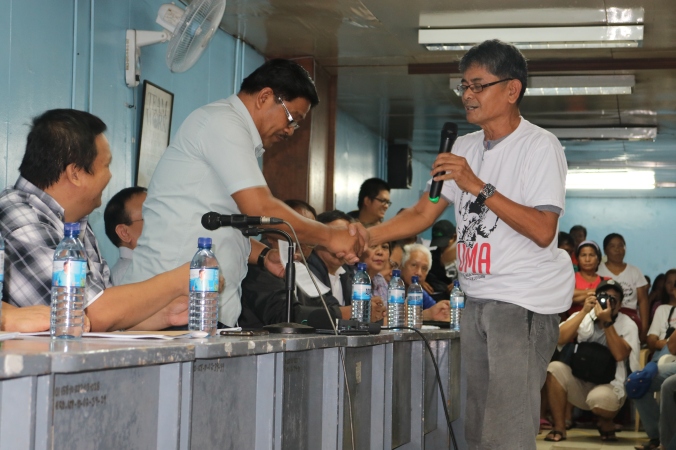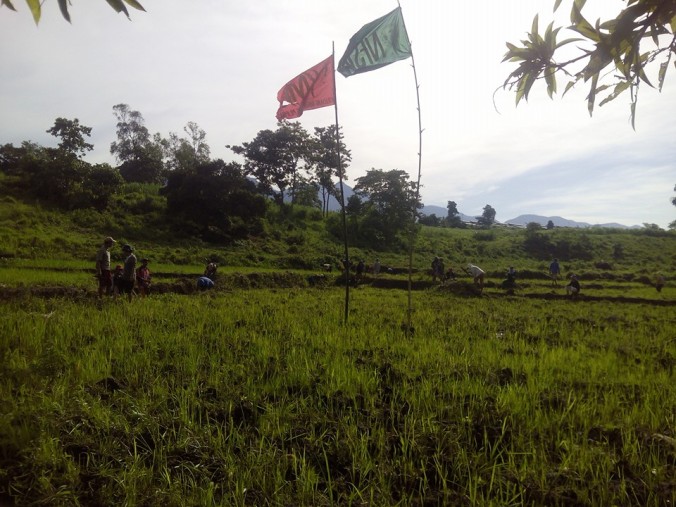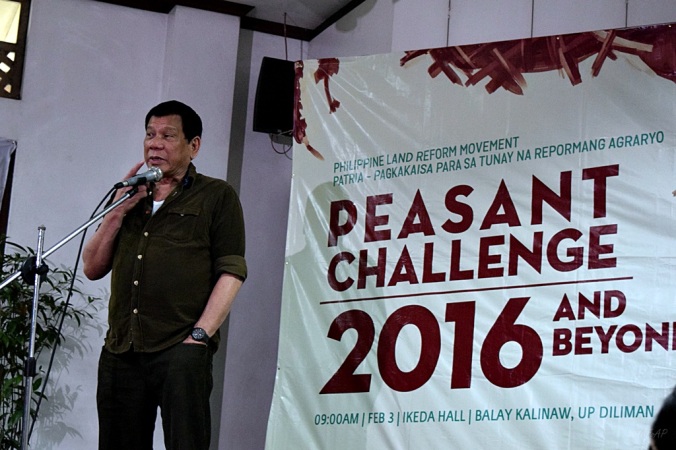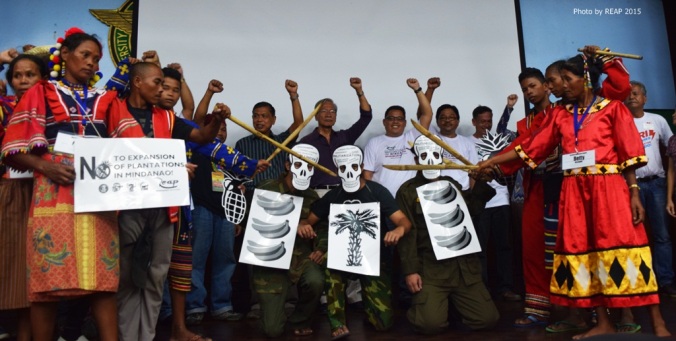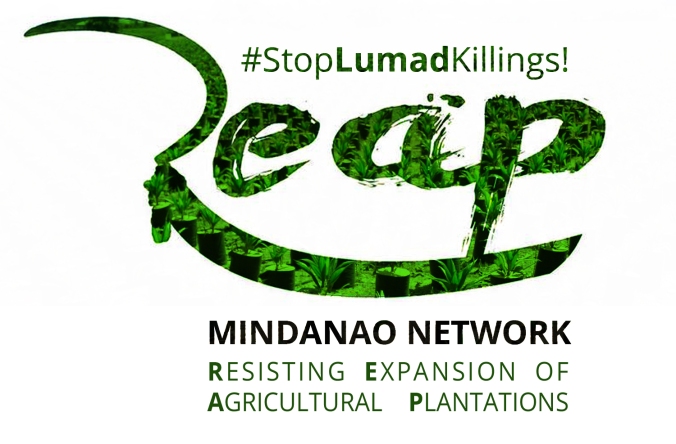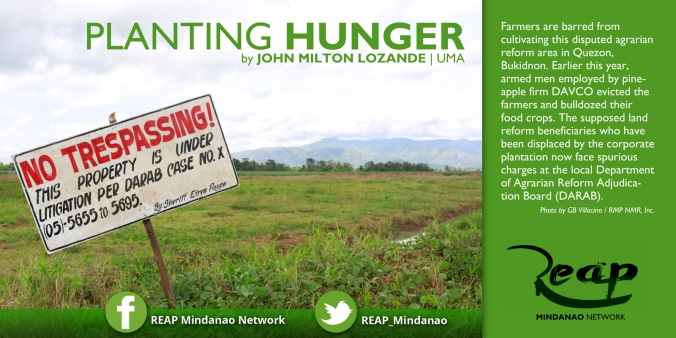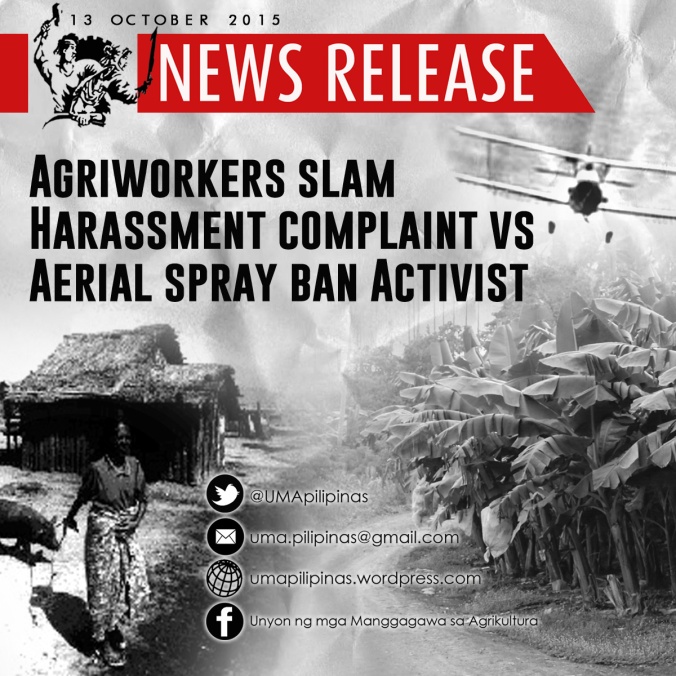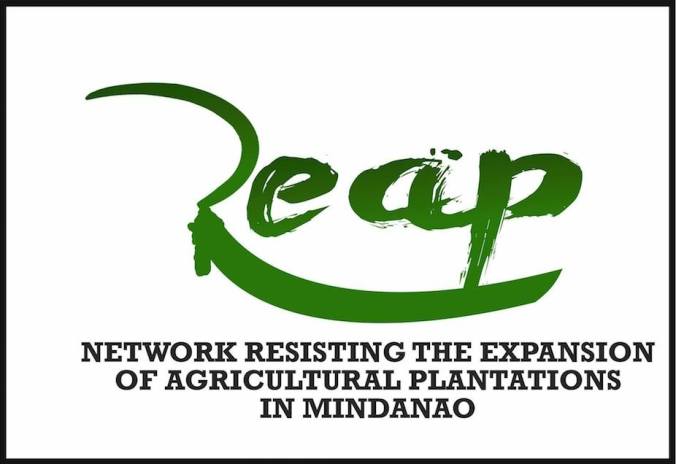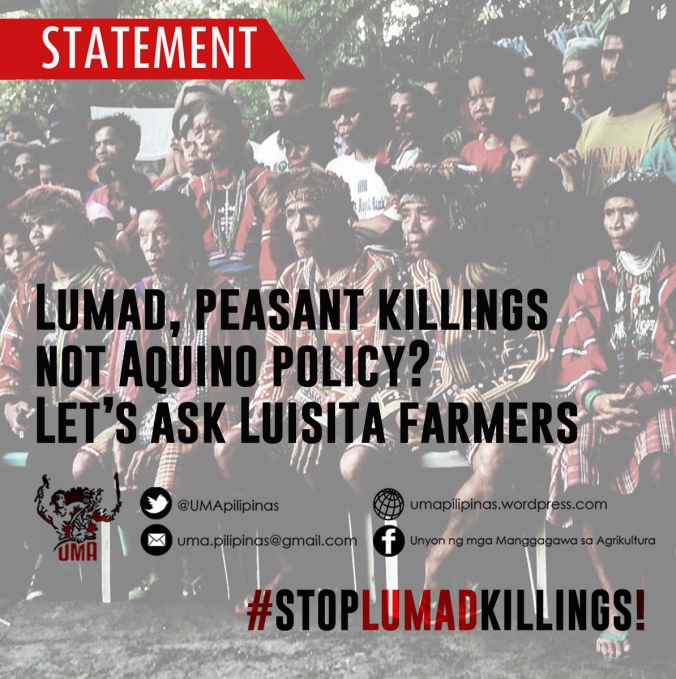
DEKLARASYON NG PAGKAKAISA
Ikalawang Pambansang Pagtitipon ng mga Manggagawa sa Asukal
2nd National Sugar Workers Summit
Agosto 30-31, 2016
Kami, mga lider at kinatawan ng mga unyon, asosasyon at organisasyon ng mga manggagawang-bukid sa tubuhan at mga manggagawang agrikultural sa ilohan ng asukal at planta ng bioethanol na matatagpuan sa iba’t ibang sulok ng bansa, ngayon ay nagkakaisa sa pagtataguyod at pagtatanggol sa interes, kagalingan at kapakanan ng aming hanay.
Kami ay nagpupursige sa pagpapatatag ng aming pagkakaisa sa pamamagitan ng aming mga lokal na unyon at samahan sa ilalim ng National Federation of Sugar Workers (NFSW), at sa Unyon ng mga Manggagawa sa Agrikultura (UMA), bilang pampulitikang sentro ng pakikibaka ng lahat ng mga manggagawang agrikultural sa bansa.
Nagkakaisa kami ngayon sa mapangahas na pagmumulat, pag-oorganisa at pagpapakilos sa aming hanay, paglulunsad ng malawak na propaganda at pampulitikang edukasyon, at pagkakasa ng mga lokal na kampanya at pakikibakang masa at pambansang koordinadong pagkilos, upang makamit ang sumusunod na mga layunin:
1.Ipatupad ang tunay na reporma sa lupa at pambansang industriyalisasyon. Ipamahagi ang lupa sa mga magsasaka, manggagawa sa agrikultura at manggagawang-bukid. Wakasan na ang monopolyo sa lupa ng mga panginoong maylupa at mga lokal at dayuhang agrikorporasyon sa bansa. Ibasura at itigil ang iba’t ibang iskema na nagkakait sa karapatan sa lupa ng mga magbubukid gaya ng Stock Distribution Option (SDO), at mga Agribusiness Venture Agreement (AVA) tulad ng leaseback, contract growing, corporative scheme; sugar block farming; at rentahan o aryendo. Kamtin ang lupa at hustisya para sa mga manggagawang-bukid sa Hacienda Luisita at sa buong bansa.
2.Para sa kagalingan ng magbubukid at pag-unlad ng ekonomiya, isabatas at ipatupad ang Genuine Agrarian Reform Bill (GARB) na isinumite bilang House Bill 555 ng Anakpawis Partylist at Makabayan bloc ngayong ika-17 Kongreso.
3.Ibasura ang liberalisasyon sa industriya ng asukal at agrikultura ng bansa na kaakibat ng deregulasyon, pribatisasyon at denasyunalisasyon o mga neoliberal na dikta ng imperyalistang globalisasyon. Ibaklas ang agrikultura ng bansa sa General Agreeement on Tariffs and Trade-World Trade Organization (GATT-WTO), Asia Pacific Economic Cooperation (APEC), ASEAN Free Trade Agreement (AFTA) at iba pang di-pantay na kasunduan sa ekonomya at kalakalan.
4.Itaas ang sahod ng mga manggagawa sa mga ilohan, planta, at manggagawang-bukid sa tubuhan. Itakwil ang sahod-alipin sa mga manggagawang agrikultural na dulot ng iskemang pakyaw, at iba pang anyo ng paglabag sa mandated daily minimum wage sa mga manggagawa sa agrikultura. Ipatupad ang pambansang minimum na sa sahod na Php 750 kada araw para sa mga manggagawa sa pribadong sektor, kasama na rito ang mga manggagawa sa asukal.
5.Itaguyod ang ligtas at makataong kondisyon sa paggawa at kaseguruhan sa trabaho. Itigil ang kontraktwalisasyon. Parusahan ang mga lumalabag sa karapatan ng mga manggagawa at mga kaso ng pagpapabaya sa kaligtasan at kalusugan ng mga manggagawa sa mga lugar ng trabaho.
6.Maagap na ayuda o tulong para sa mga manggagawang agrikultural at manggagawang-bukid sa tubuhan sa panahon ng tiempo muerto o off-milling season, at sa tuwing may mga sakuna at kalamidad.
7. Ibalik sa mga manggagawa sa tubuhan at ilohan ang Sugar Amelioration Fund (SAF). Direktang ipamahagi ang SAF sa mga benepisyaryo sa pamamagitan ng mga unyon, samahan, organisasyon o kooperatiba ng mga manggagawang agrikultural. Ituloy ang malawakang imbestigasyon sa istatus ng implementasyon ng Social Amelioration Program (SAP) at Social Amelioration and Welfare Program (SAWP) sa industriya ng asukal at biofuel. Itulak ang kabuuang awdit sa pondo ng mga ito at maging sa mga proyekto, istruktura o ari-arian na naipundar nang dahil sa SAP at SAWP.
8.Maglaan ng lupaing mapapagtanman ng pagkain para sa mga manggagawang agrikultural sa mga asyenda at plantasyon. Suportahan at kilalanin ang sama-samang bungkalan at mga inisyatiba ng mga magbubukid para sa seguridad sa pagkain.
9.Itigil ang land-use at crop conversion sa mga tubuhan, na para diumano sa mga “proyektong pangkaunlaran” at agresibong ekspansyon ng mga dambuhalang plantasyon na kontrolado ng mga dayuhang agrikorporasyong MNC at TNC. Ang mga ito ay nagdudulot ng marahas na pagpapalayas at pangangamkam, kagutuman, at pagkasira ng kalikasan sa mga komunidad ng magbubukid at manggagawa sa agrikultura.
10. Ipatupad ang pambansang industriyalisasyon at mga kongkretong hakbang sa pagpapaunlad ng industriya ng asukal at biofuel nang may malalim na pagsasaalang-alang sa kagalingan at kapakanan ng mga manggagawa sa industriya; sa pangangailangan sa konsumo ng mamamayang Pilipino; at sa pagpapaunlad ng iba pang lokal na industriya na nakadepende sa mga produktong mula sa tubo.
11. Itigil ang militarisasyon sa kanayunan, pampulitikang panunupil, pamamaslang at paglabag sa karapatang tao. Hustisya para sa mga biktima. Ibasura ang gawa-gawang kaso laban sa mga manggagawa at magbubukid. Karampatang bayad-pinsala sa mga sinirang pananim at ari-arian ng mga biktima. Palayain ang lahat ng bilanggong pulitikal.
12. Suportahan ang usapang pangkapayapaan sa pagitan ng Gobyerno ng Republika ng Pilipinas at Pambansa-Demokratikong Prente ng Pilipinas (GPH-NDFP peace talks) lalo na hinggil sa pagtalakay at pagkakasundo sa kinakailangang mga sosyo-ekonomikong reporma gaya ng tunay na reporma sa lupa at pambansang industriyalisasyon. Ang malalim na pagtalakay at pagresolba sa mga ugat ng armadong tunggalian ang siyang tutugon sa hinaing ng mamamayang naghihimagsik at magdudulot ng makatarungan at pangmatalagang kapayapaan sa ating bayan.
Pinagtibay ngayong ika-31 ng Agosto, 2016, sa Ikalawang Pambansang Pagtitipon ng mga Manggagawa sa Asukal (2nd National Sugar Workers Summit) sa DOLE Occupational Safety and Health Center, Lungsod Quezon.
Nilagdaan ng mga kinatawan ng sumusunod na unyon at organisasyon ng mga manggagawa sa asukal:
DANILO RAMOS, Pangkalahatang Kalihim
Unyon ng mga Manggagawa sa Agrikultura (UMA)
HERNANE BARROS, Pangkalahatang Kalihim
National Federation of Sugar Workers (NFSW)
Negros Island Region
KAISAHAN – Batangas, Southern Tagalog
Alyansa ng mga Manggagawang-Bukid sa Asyenda Luisita (AMBALA),
Tarlac, Central Luzon
UMA- Isabela, Cagayan Valley
OGYON-Bukidnon, North Central Mindanao
Nagkahiusang Mag-uuma sa Davao del Sur (NAMADDS), Far-South Mindanao
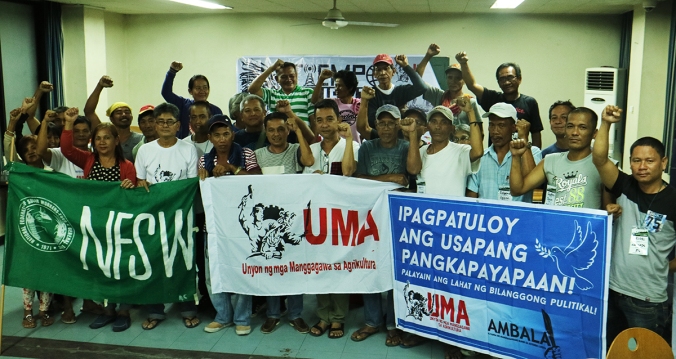
DEKLARASYON NG PAGKAKAISA
Ikalawang Pambansang Pagtitipon ng mga Manggagawa sa Asukal
2nd National Sugar Workers Summit
Agosto 30-31, 2016
Kami, mga lider at kinatawan ng mga unyon, asosasyon at organisasyon ng mga manggagawang-bukid sa tubuhan at mga manggagawang agrikultural sa ilohan ng asukal at planta ng bioethanol na matatagpuan sa iba’t ibang sulok ng bansa, ngayon ay nagkakaisa sa pagtataguyod at pagtatanggol sa interes, kagalingan at kapakanan ng aming hanay.
Kami ay nagpupursige sa pagpapatatag ng aming pagkakaisa sa pamamagitan ng aming mga lokal na unyon at samahan sa ilalim ng National Federation of Sugar Workers (NFSW), at sa Unyon ng mga Manggagawa sa Agrikultura (UMA), bilang pampulitikang sentro ng pakikibaka ng lahat ng mga manggagawang agrikultural sa bansa.
Nagkakaisa kami ngayon sa mapangahas na pagmumulat, pag-oorganisa at pagpapakilos sa aming hanay, paglulunsad ng malawak na propaganda at pampulitikang edukasyon, at pagkakasa ng mga lokal na kampanya at pakikibakang masa at pambansang koordinadong pagkilos, upang makamit ang sumusunod na mga layunin:
Ipatupad ang tunay na reporma sa lupa at pambansang industriyalisasyon. Ipamahagi ang lupa sa mga magsasaka, manggagawa sa agrikultura at manggagawang-bukid. Wakasan na ang monopolyo sa lupa ng mga panginoong maylupa at mga lokal at dayuhang agrikorporasyon sa bansa. Ibasura at itigil ang iba’t ibang iskema na nagkakait sa karapatan sa lupa ng mga magbubukid gaya ng Stock Distribution Option (SDO), at mga Agribusiness Venture Agreement (AVA) tulad ng leaseback, contract growing, corporative scheme; sugar block farming; at rentahan o aryendo. Kamtin ang lupa at hustisya para sa mga manggagawang-bukid sa Hacienda Luisita at sa buong bansa.
Para sa kagalingan ng magbubukid at pag-unlad ng ekonomiya, isabatas at ipatupad ang Genuine Agrarian Reform Bill (GARB) na isinumite bilang House Bill 555 ng Anakpawis Partylist at Makabayan bloc ngayong ika-17 Kongreso.
Ibasura ang liberalisasyon sa industriya ng asukal at agrikultura ng bansa na kaakibat ng deregulasyon, pribatisasyon at denasyunalisasyon o mga neoliberal na dikta ng imperyalistang globalisasyon. Ibaklas ang agrikultura ng bansa sa General Agreeement on Tariffs and Trade-World Trade Organization (GATT-WTO), Asia Pacific Economic Cooperation (APEC), ASEAN Free Trade Agreement (AFTA) at iba pang di-pantay na kasunduan sa ekonomya at kalakalan.
Itaas ang sahod ng mga manggagawa sa mga ilohan, planta, at manggagawang-bukid sa tubuhan. Itakwil ang sahod-alipin sa mga manggagawang agrikultural na dulot ng iskemang pakyaw, at iba pang anyo ng paglabag sa mandated daily minimum wage sa mga manggagawa sa agrikultura. Ipatupad ang pambansang minimum na sa sahod na Php 750 kada araw para sa mga manggagawa sa pribadong sektor, kasama na rito ang mga manggagawa sa asukal.
Itaguyod ang ligtas at makataong kondisyon sa paggawa at kaseguruhan sa trabaho. Itigil ang kontraktwalisasyon. Parusahan ang mga lumalabag sa karapatan ng mga manggagawa at mga kaso ng pagpapabaya sa kaligtasan at kalusugan ng mga manggagawa sa mga lugar ng trabaho.
Maagap na ayuda o tulong para sa mga manggagawang agrikultural at manggagawang-bukid sa tubuhan sa panahon ng tiempo muerto o off-milling season, at sa tuwing may mga sakuna at kalamidad.
Ibalik sa mga manggagawa sa tubuhan at ilohan ang Sugar Amelioration Fund (SAF). Direktang ipamahagi ang SAF sa mga benipisyaryo sa pamamagitan ng mga unyon, samahan, organisasyon o kooperatiba ng mga manggagawang agrikultural. Ituloy ang malawakang imbestigasyon sa istatus ng implementasyon ng Social Amelioration Program (SAP) at Social Amelioration and Welfare Program (SAWP) sa industriya ng asukal at biofuel. Itulak ang kabuuang awdit sa pondo ng mga ito at maging sa mga proyekto, istruktura o ari-arian na naipundar nang dahil sa SAP at SAWP.
Maglaan ng lupaing mapapagtanman ng pagkain para sa mga manggagawang agrikultural sa mga asyenda at plantasyon. Suportahan at kilalanin ang sama-samang bungkalan at mga inisyatiba ng mga magbubukid para sa seguridad sa pagkain.
Itigil ang land-use at crop conversion sa mga tubuhan, na para diumano sa mga “proyektong pangkaunlaran” at agresibong ekspansyon ng mga dambuhalang plantasyon na kontrolado ng mga dayuhang agrikorporasyong MNC at TNC. Ang mga ito ay nagdudulot ng marahas na pagpapalayas at pangangamkam, kagutuman, at pagkasira ng kalikasan sa mga komunidad ng magbubukid at manggagawa sa agrikultura.
Ipatupad ang pambansang industriyalisasyon at mga kongkretong hakbang sa pagpapaunlad ng industriya ng asukal at biofuel nang may malalim na pagsasaalang-alang sa kagalingan at kapakanan ng mga manggagawa sa industriya; sa pangangailangan sa konsumo ng mamamayang Pilipino; at sa pagpapaunlad ng iba pang lokal na industriya na nakadepende sa mga produktong mula sa tubo.
Itigil ang militarisasyon sa kanayunan, pampulitikang panunupil, pamamaslang at paglabag sa karapatang tao. Hustisya para sa mga biktima. Ibasura ang gawa-gawang kaso laban sa mga manggagawa at magbubukid. Karampatang bayad-pinsala sa mga sinirang pananim at ari-arian ng mga biktima. Palayain ang lahat ng bilanggong pulitikal.
Suportahan ang usapang pangkapayapaan sa pagitan ng Gobyerno ng Republika ng Pilipinas at Pambansa-Demokratikong Prente ng Pilipinas (GPH-NDFP peace talks) lalo na hinggil sa pagtalakay at pagkakasundo sa kinakailangang mga sosyo-ekonomikong reporma gaya ng tunay na reporma sa lupa at pambansang industriyalisasyon. Ang malalim na pagtalakay at pagresolba sa mga ugat ng armadong tunggalian ang siyang tutugon sa hinaing ng mamamayang naghihimagsik at magdudulot ng makatarungan at pangmatalagang kapayapaan sa ating bayan.
Pinagtibay ngayong ika-31 ng Agosto, 2016, sa Ikalawang Pambansang Pagtitipon ng mga Manggagawa sa Asukal (2nd National Sugar Workers Summit) sa DOLE Occupational Safety and Health Center, Lungsod Quezon.
___________________
___________________
Unyon ng mga Manggagawa sa Agrikultura (UMA)
___________________
___________________
___________________
National Federation of Sugar Workers (NFSW)
Negros Island
___________________
___________________
___________________
Kaisahan – Batangas
___________________
___________________
___________________
Alyansa ng mga Manggagawang-Bukid sa Asyenda Luisita
___________________
___________________
___________________
UMA- Isabela, Cagayan Valley
____________________
____________________
Nagkahiusang Mag-uuma sa Davao del Sur


